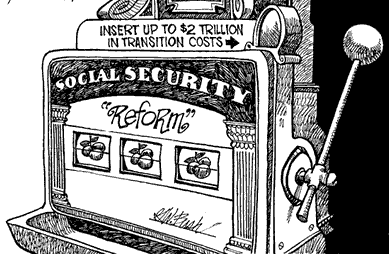|
|
Remember Social Security?
Chicago Tribune
July 9, 2005

Republicans in Congress have tried to revive the Social Security reform movement with an idea that they say would keep the system's money right in the system. That is, surplus money from Social Security taxes would be used to create private retirement accounts, instead of going to the federal government for general spending.
Spend Social Security dollars on Social Security. Keep those dollars safe and secure and out of the hands of Congress where, guaranteed, they will be spent. That's the pitch, anyway. "This bill will provide future retirees with fully inheritable Social Security accounts that can't be spent by Congress, ensuring that taxes paid into Social Security are used for Social Security," said Rep. Jim McCrery (R-La.), a sponsor of the House version of this idea.
If only it were that simple. The House and Senate GOP proposals differ in some details, but both appear to be convoluted schemes that, at least at the outset, would create extremely limited private accounts. They don't necessarily wean the federal government from its reliance on borrowing. Those who opted to create private accounts would, for the first few years, be allowed to invest only in Treasury securities.
The proposals don't guarantee that private citizens would get more-appealing options for investing private accounts, and worst of all, they don't address the coming shortfall in Social Security.
Republicans deserve some credit for trying to keep moving on the Social Security debate, and for thinking of new ways to create private accounts. Perhaps there will be more to like when House Republican leaders unveil what they say will be broad legislation to enhance and protect retirement savings.
But the Social Security debate is pretty much right where it started. Democratic leaders are content to take potshots at GOP ideas and ignore the looming Social Security problem. Republicans are focused on private accounts, which are a good idea, but don't by themselves fix the system's troubles.
So, one more time:
According to the latest report of the Social Security trustees, the system will collect more money in payroll taxes than it needs to pay in benefits until 2017. (Next year the system will collect $86 billion more than it pays out.) The surpluses are lent to the federal government, which spends the money and promises to pay it back with interest.
After 2017, there will be no surpluses, and the government will have to start paying its debts to Social Security. The gap between revenues and expenses will grow quickly. That's going to mean drastically higher taxes, higher borrowing, lower spending or a combination of all three. And the longer we stall on a solution, the more drastic the solution will be.
Republicans and Democrats have to talk now about reducing growth in future benefits or raising payroll taxes or both. Sen. Robert Bennett (R-Utah) has introduced a bill that would progressively index benefits so that the poor are protected and the more affluent see their benefits rise more slowly. President Bush has expressed support for such an idea.
In separate legislation, Bennett has proposed allowing workers to contribute their own money, rather than a portion of their payroll taxes, into personal accounts. Such "add-on" accounts, which some Democrats have embraced, don't provide as much incentive to save, but they should be in the debate.
That debate has to focus on solvency with, it is hoped, a companion proposal for personal accounts. But solvency first. It's the critical issue.
|
|




